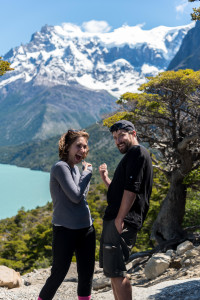There are lots of pesky bugs out there that can make you really sick. “Ain’t nobody got time for that!” Go to the CDC website to double check what vaccinations are recommended for the countries you are traveling to. Many countries require a Yellow Fever vaccination certificate in order to enter their borders.
You must remember to factor in the cost of travel vaccinations into your overall budget. Some vaccinations such as Hep A and B and Tetanus should be covered by your insurance. YAY OBAMACARE! Some of the other vaccinations can be quite pricey. I think I spent an extra $300 making sure my vaccinations were up to date, so that is definitely something that you want to consider when making your budget.
I also want to point out that a really great place to get travel vaccinations in Los Angeles and around the country is Passport Health . They got my boyfriend and I an appointment very quickly, were extremely knowledgeable, and also had the last vials of the yellow fever vaccination in the entire city.
Depending on where you’re buzzing around the world here is a list of some of the preventable illnesses you can get.
Hepatitis A: Present in all countries with poor sanitation and public hygiene.
Hepatitis B: Found in South East Asia, the Middle East, South and Western Pacific and parts of the Caribbean.
Tetanus: present WORLDWIDE!
Diphtheria: Found in most of sub-Saharan Africa, parts of South East Asia and South America.
Typhoid: Present worldwide, however it is worse where food and water may be contaminated with sewage — in Africa, Far East and South America.
Yellow Fever: Present in tropical Africa and South America. You may be required to show a Yellow Fever vaccination certificate to enter certain countries if you are traveling from an infected area.
Polio: Found in developing countries in Asia and Africa.
Japanese B Encephalitis: Occurs following the rainy season in China, regions of Nepal, northern Burma, eastern and southern states of India, northern Sri Lanka, northern Thailand, Laos and Vietnam. Occasional outbreaks have been reported in Malaysia, Indonesia, Korea, Singapore, southern parts of Thailand, southern Sri Lanka and all of India.
Rabies: At great risk in Asia, Africa and South America.
Tick Borne Encephalitis: Found in European Russia, Austria, Hungary, the Balkans, Czech Republic, Slovakia and Scandinavia. It can also be found in eastern parts of China.
How are these diseases transmitted?
Hepatitis A– Associated with poor hygiene and sanitation and is transmitted by infected food and drink and personal contact.
Hepatitis B- Hepatitis B is a blood borne viral infection that is spread through infected blood, contaminated needles, etc.
Tetanus/Diphtheria/Pertussis– Diphtheria is transmitted through respiratory droplets, personal contact and contaminated clothing, bed linen etc. Tetanus spores are present in the soil worldwide and the disease is caused from contaminated wounds.
Typhoid– Associated with poor hygiene and sanitation and is transmitted by infected food and drink and by the fecal oral route.
Yellow Fever – This is a serious viral illness spread by the bite of an infected mosquito.
Polio– Poliovirus is usually spread from person to person through infected feces entering the mouth. It may also be spread by food or water containing human feces and less commonly from infected saliva.
Japanese B Encephalitis– This is a rare but serious insect borne disease that is transmitted by the bite of an infected mosquito.
Rabies – The risk to travelers in endemic areas is proportional to their exposure to potentially rabid animals. Travelers in tourist resorts are at very low risk.
Tick-Borne Encephalitis– This is a viral infection transmitted by the bite of an infected tick and rarely from drinking unpasteurized milk.
When should I get my vaccinations and how long do they last?
Hepatitis A
A single vaccination provides immunity up to one year and is effective after two to four weeks. A booster dose is given between six and twelve months of the original and gives immunity up to ten years-effective immediately.
Hepatitis B
The vaccination is given as a course of three injections, the second 28 days after the first and the third 6 months after the second. Immunity lasts for at least five years.
Tetanus/Diphtheria/Pertussis
Tetanus immunization is generally required before starting school. Five doses of vaccine are recommended. When over ten years has elapsed since the primary immunization course or the person is travelling to a country where tetanus is indicated, a tetanus booster should be given. This could either be in the form of a “Td vaccine” which is a 2-in-1 vaccine that protects against tetanus and diphtheria and is required every 10 years or in the form of the new “Tdap vaccine” one time. The Tdap vaccine is a 3-in-1 vaccine that comprises tetanus toxoid, reduced diphtheria toxoid and a cellular pertussis.
Diphtheria vaccination is also one of the recommended childhood immunizations which should begin during infancy. A diphtheria booster should also be given if travel is for more than one month to a country or region where it is indicated.
Typhoid
One dose is effective after two or three weeks and immunity lasts up to three years
Yellow Fever
The vaccination must be given 10 days before leaving and is good for ten years. This is a live vaccine and it has to be given on the same day as other live vaccinations (Polio), or 3 weeks apart. Every once-in-awhile the U.S experiences a shortage of the yellow fever vaccination so you want to make sure you get this with ample time before your trip. REMINDER: Carry your certificate with you.
Polio
Polio vaccination is another one of the recommended childhood immunizations and vaccination should begin during infancy. A polio booster may also be advised for travel to certain countries if ten years has elapsed since the primary course.
Japanese B Encephalitis
The vaccination consists of two doses, the second administered 28 days after the first dose. The persistence of the immunity is unknown.
Rabies
Vaccinations against rabies is carried out in two distinct situations:
- To protect those who are likely to be exposed – Pre-exposure.
- To prevent establishment after exposure has taken place – Post-exposure.
The vaccines used for pre and post exposure are the same but the schedule of administration is different.
For pre-exposure three doses are given on days 0, 7 and 21 to 28 (a few days’ variation in timing is not important). A booster dose is required every two to three years depending upon risk of exposure.
Tick-Borne Encephalitis
The course comprises three doses. The first dose on day 0, the second dose one to three months later and the third dose five to twelve months after the second. It gives a 97% protection rate and lasts for three years.
The booster comprises a single dose after no more than three years. It is effective immediately and subsequent boosters should be given at three to five year intervals.
Get vaccinated.
A disease that can cause complications for a lifetime isn’t a souvenir you want to bring home.



